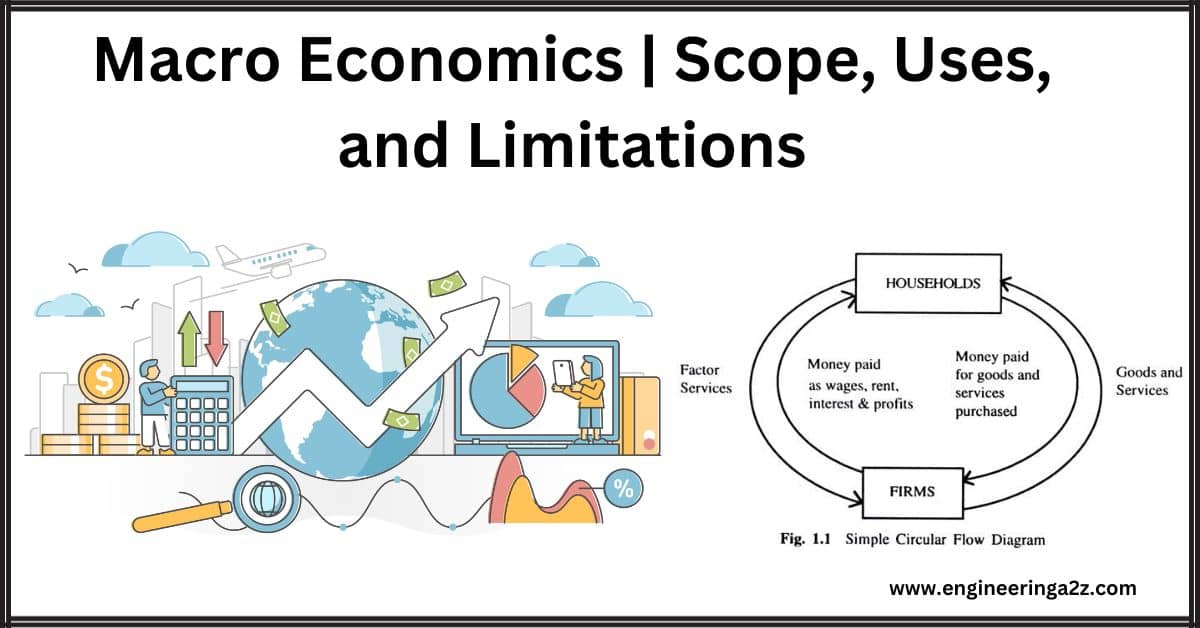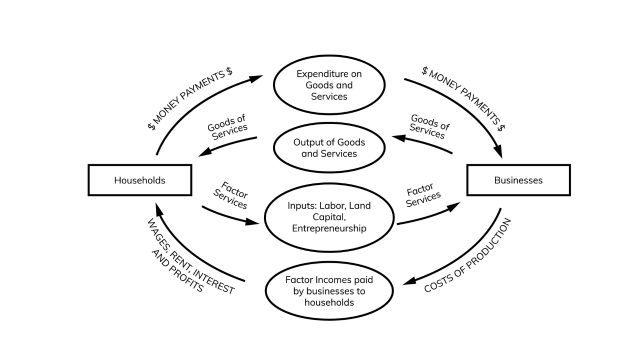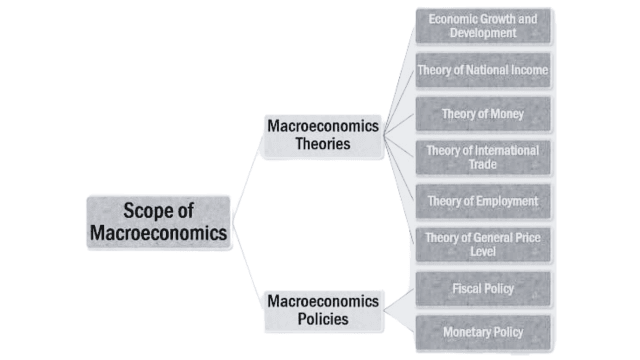
Table of Contents
‘Macro’ as used in the English language originates in the Greek word Makros, meaning large. Hence, in macroeconomics, economic problems are studied from the point of view of the entire economy, for example, aggregate consumption, aggregate employment, national income, general price- etc.
Definitions
(i) In the words of Boulding, “Macroeconomic theory is that part of economics which studies all averages and aggregates of the system.”
(ii) According to Shapiro, “Macroeconomics deals with the functioning of the economy as a place.”
(iii) In the words of Ackley Gardner, “Macroeconomics is concerned with such variables as the regulated volume of the output of an economy, with the extent to which its resources are employed, with the size of national income and with the general price level.”

Scope of Macro Economics
Macroeconomics deals with the full utilization of national resources. These resources have a complete pact on national income, employment, effective demand, aggregate demand, aggregate supply, total saving, total investment, price level, economic development, etc. Its scope can be divided into the following parts:
(i) Theory of National Income: Macroeconomics studies the concept of national income, different elements, methods of measurement, and social accounting.
(ii) Theory of Employment: It studies the problems of employment and unemployment Different factors determining employment, such as effective demand, aggregate supply, aggregate demand, total consumption, total investment, total saving, multiplier, etc. are studied under this theory.
(iii) Theory of Money: Changes in the demand for and supply of money have a great bearing on the level of employment. Thus under macroeconomics, functions of money and theories related thereto are studied. Banks and other financial institutions are also studied under it.
(iv) Theory of General Price Level: Problems concerning inflation and deflation are part of the study of macroeconomics.
(v) Theory of Economic Growth: One studies problems concerning economic development or increase in per capita real income. The economic development of under-developed countries is also the subject of the study of macroeconomics, besides the study of governments’ fiscal and monetary policies.
(vi) Theory of International Trade: It also studies principles determining trade among different countries. Tariffs, protection, and free-trade policies fall under foreign exchange.
(vii) Macro Theory of Distribution: It studies the macro theory of distribution, that is, how the share of different factors of production is determined in the national income. In other words, how mud is given to labourers and how much to landlords and entrepreneurs. It also deals with the unequal distribution of income.
(viii) Theory of Business Fluctuations: It also deals with the fluctuations in the level of employment, total expenditure, general price level, etc., and how these business fluctuations can be checked or controlled.

Uses of Macro-Economics
After the publication of Keynes’ famous book, “Employment, interest and Real Theory Money”, (1936) study of macroeconomics assumed great importance. Its main uses are under
(1) Helpful in understanding the functioning of an Economy: Modern economy is very complex. Many economic variables which are interdependent operate in it. In order to understand the functioning and organization of the economy, knowledge of the functioning of the individual units alone (micro-study) is not enough. It needs the study of the entire economy.
(2) Formulation of Economic Policy: The study of macroeconomics is essential to formula economic policies. Almost all modern governments depend upon the aggregates of economic variables such as national income, total employment, total investment, total saving, general price level, etc. in order to formulate economic policies. From the viewpoint of economic policy, macroeconomics is so important because the economic policies of the government are concerned not with individuals, but with groups of individuals.
(3) Control over Trade Cycles: Trade cycles or economic fluctuations constitute an import economic problem. Economic changes occur rapidly in a capitalist economy. These changes have adverse effects on the economy. Their control becomes very essential. These economic changes depend on the cause of trade cycles and methods to control them, the study of macroeconomics is essential.
(4) Change in the General Price: The value of money or, what is called the general price level, has been undergoing wide fluctuations during the twentieth century. A fall in the value of money or a rise in price level is called Inflation and a rise in the value of money or a fall in price level is called Deflation. Economists have to seek the help of the macroeconomy in order to control these changes in the value of money.
(5) Study of National Income: In modern times, almost in every country, it is through the study. of national income that the economic situation of different countries is known. It is essential for every country to have full knowledge of its national income in order to formulate its policies concerning planning, welfare, war, etc. Knowledge of national income is possible through macro analysis alone.
(6) Helpful in Economic Planning: Under-developed countries place great stress on the importance of economic planning. Macroeconomic analysis alone makes it possible to formulate and adopt proper policies and techniques concerning economic planning and then enforce the same.
(7) Helpful in the study of microeconomics: Macroeconomics has a great role in framing the theories and laws of microeconomics. For instance, the law of diminishing marginal utility could be framed only after analyzing the behaviour of groups of people. It is on the basis of this analysis that a conclusion is drawn, that when the quantity of consumption of a commodity is increased its marginal utility goes on diminishing. As a matter of fact, no law of microeconomics can be framed without the study of relevant aggregates.
(8) Helpful in Understanding Macro-economic Paradoxes: It is a matter of common experience that many economic activities that are proper for an individual prove to be undesirable when applied to the entire society. Boulding calls it “Economic paradoxes” and Samuelson calls it “The Fallacy of Composition.” For example, when an individual saves, it will be of help to him but if all people begin to save then the aggregate demand will go down. Fall in aggregate dependent fall in total output and consequently fall in national income and level of employment. Thuying which are virtue for an individual becomes a vice for society. The study of macroeconomics helps in understanding these paradoxes.
Limitations of Macro-Economics
The main limitations of macroeconomics are under-
(1) Dependence on Individual Units: Several conclusions of macroeconomics are based on the sum total of individual units. In fact, it is not correct, because what is true for individuals may not necessarily be true for the whole economy. For instance, an individual may save in terms of money but able everybody starts saving, the aggregate demand will fall causing a reduction in national income. It will result In a fall and not a rise in aggregate savings.
(2) Heterogeneous Units: Under macroeconomics, heterogeneous, units are studied. These homogeneous measures are measured in different ways. It is not possible to express these units in uniform numbers or homogenous measures.
(3) The Composition of the Structure of the Aggregate is More Important than the Aggregate itself: Macroeconomics studies aggregate but as a matter of fact, it is the composition of the structure of the aggregate that influences an economy more than the aggregate itself. Thus, for a proper study of an economy, knowledge of the composition of the structure of the aggregate is as much seen as the aggregate itself.
(4) Different Effects of Aggregates: Another difficulty in the study of macro economics is that it does not study the different effects of an aggregate on different sectors of an economy. Macroeconomic tendency does not have a uniform effect on all sectors of an economy. For example, rise in price-level level the traders and the industrialists but the wage-earners are the losers.
(5) Limited Application: Another limitation of macroeconomics is that most of the modes relating to it have only theoretical significance. They have very little use in practical life. Moreover, it is very difficult to measure various aggregates of macroeconomics.
(6) It ignores the contribution of Individual Units: Macroeconomic analysis throws light only on the functioning of the aggregates. However, in real life, the economic activities and decision taken by individual units on a private level have their effects on the economy as a whole. Such effects an not known by the study of macroeconomics alone.
Frequently Asked Questions (FAQs)
What is macro economics?
Macroeconomics studies an economy’s overall performance and behaviour, focusing on factors like GDP, inflation, unemployment, and government policies to understand and manage economic growth and stability.
What are the benefits of macroeconomics?
Macroeconomics studies national economies, helping policymakers understand, manage, and improve economic performance, stability, and growth for societal well-being.
What are the 3 types of macroeconomics?
1. Growth Economics: Focuses on factors driving long-term economic expansion.
2. Monetary Economics: Examines central banks, money supply, and monetary policies.
3. Fiscal Economics: Analyzes government spending, taxation, and fiscal policies’ impact on the economy.What are the 4 principles of macroeconomics?
1. Aggregate Demand and Supply: Analyzing total spending and production.
2. Economic Growth: Factors influencing an economy’s long-term expansion.
3. Inflation: Examining the rise in general price levels.
4. Unemployment: Studying joblessness and its causes.
Read Also:
- Economics For Engineers Book PDF
- Comparison Between Microeconomics and Macroeconomics
- Marketing Management | Objectives & Functions of Marketing Management
- Power Quality | Sources Of Pollution, Need, and Effects
- Tidal Energy | Working, Parts, and Applications






Leave a Reply